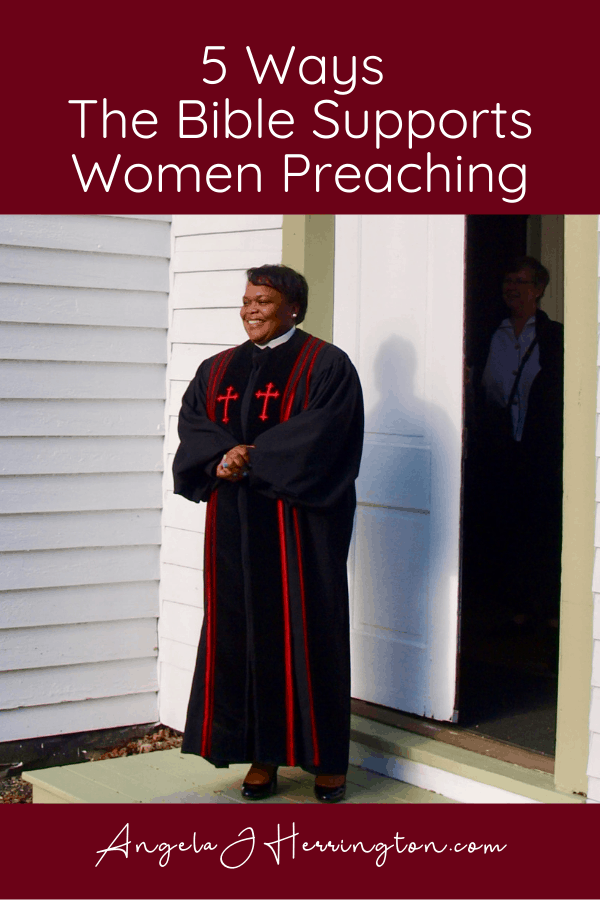Women who are deconstructing their faith are often told the Bible says we are not allowed to be pastors, preachers, and leaders in the church if it gives us authority over men.
There are a TON of reasons people give to back up this idea but every single one relies on twisting scripture, taking it out of context (like 1 Timothy 2:12), and upholding traditional, patriarchal views of men and women’s roles in the church. So let’s start with the basics.
Anytime you take 20 words out of the Bible without connecting it to the surrounding passage, you’re taking it out of context. Bible exegesis 101(which means to critically study and interpret a text) requires us to look at what comes right before and right after this passage to help us understand what it means. Isolating 1 Timothy 2:12 is taking the Bible out of context.
Also, as an FYI, the KJV and the NKJV are notoriously patriarchal and reflect much of the culture it was translated in that wasn’t in earlier biblical texts.
It is wise to compare multiple translations and get as close to the original writings as possible. When you look at original language used (versus the translations that most of us know), context, and examples given, it becomes evident very quickly that God supports women in, and calls them to, preaching and leading roles.
So let’s look at some scripture and debunk the toxic, patriarchal teachings you’ve probably been taught by the church.
Here are 5 ways the Bible supports women preaching.
1. Paul’s words in 1 Timothy 2 were most likely about specific women in Timothy’s church being unruly, not all women in the church throughout all times.
Paul (the one who wrote that passage) says in 1 Timothy that he doesn’t permit a woman, who is learning, to ‘usurp authority’ over a man. Which is quite different than saying she can’t teach or have any authority over men. Usurping authority is to steal away or to take what isn’t hers rightfully.
Sort of like overthrowing a legitimate government so you can have more power. It’s not right for men or women to do that. Most scholars believe it applies to the specific situation in the church where specific women who were uneducated were also disruptive (and usurping the actual leaders).
However, if we choose to believe that the Bible always provides universal statements, then we need to be consistent and apply the same logic to the rest of the passage.
1 Timothy also says a woman/women shouldn’t braid our hair or wear gold, pearls, or anything expensive (most likely to church). That we are to sit in silence in the church. So no “Sunday best” clothes allowed, especially if it comes with jewelry. Also no female greeters, worship leaders, or choir members. Plus no women reading scripture or giving announcements.
Again, we either need to be consistent and remove women from all of the roles mentioned in church (and make sure they dress really plainly while we’re at it), or we need to acknowledge that those instructions were most likely geared toward a few specific women who were being intentionally disruptive. As was Paul’s advice that those women shouldn’t preach. But that doesn’t mean that the other millions of women in the world shouldn’t!
2. The Bible’s instructions around preaching and using other gifts to lead in the Church are explicitly given to men AND women.
In 1 Corinthians, Paul tells the “brothers and sisters” to instruct, reveal, and prophesy to one another. When Paul and other New Testament writers give instructions to Christians about preaching and leading in the Church, they use phrases like “all of you” or “every one of you”. Which absolutely includes women!
Some examples are:
- 1 Corinthians 14:5, 14:23-26, 14:31
- 1 Peter 4:10-11
- Ephesians 5:18-20
There are too many others to list here, but you can check out this resource here for more info. The bottom line is God does not separate what women are allowed to do in the Church from what men are allowed to do in the Church.
3. The Bible’s original text offers a lot of clarity that translations do not.
An argument that I hear a lot is that “God’s Word never changes”, meaning that it’s wrong to apply new understanding to scripture, particularly if it goes against traditional teaching.
However, the statement “God’s Word never changes” is pretty problematic. What people are really saying is “Man’s translation of God’s Word never changes” which is incorrect.
Men, mostly European (AKA white), powerful men, have been translating God’s Word to fit their narrative and cultural beliefs since the beginning.
Growing up none of us used an original manuscript to learn the texts and very, very few people are fluent in the original languages, the cultural context all of these letters were written in, and the way the church has shaped our understanding for centuries. So we rely on those few experts to translate the passages and teach us as much as possible.
All that to say that there are thousands of Biblical scholars who are familiar with those sources who teach that the ban on women in the church is a human mandate, not a divine one.
I would encourage you to do a little digging into those sources to see what the earliest versions of the Bible say about women in ministry leadership. I have a list of resources for you below to help you get started!
4. God gives us several examples of female leadership (over men and women) in the Old and New Testaments.
Even if you disregard all of the previous points…The Bible supports women preaching through these sections of text:
- Deborah was an Old Testament judge, meaning she led Israel before they had a king (Judges 4-5). She was known for wisdom, spiritual insight, and success in battle. And as an important aside, there is ZERO indication in scripture that her role was assumed because there were no qualified men willing or able to lead. God called her uniquely, just as he called the other judges.
- Anna was a prophet who dedicated her life to praying, praising, and teaching in the temple. She was also one of the first people to meet Jesus as an infant, and recognized and proclaimed his divinity (Luke 2:25-38).
- Huldah was an Old Testament prophet who was a trusted source for interpreting and understanding scripture. She was even sought out by the king of Israel to teach his men about the meaning of prophecies from God (2 Kings 22:11-20).
- Priscilla was part of the church in Ephesus, and co-lead with her husband in teaching and evangelizing (Acts 18:24-26).
- Phoebe was a deacon in a formal position of leadership at a church near Rome. Paul praised her for leadership and impact, and asked the rest of the church to follow her instructions and aid her in her ministry work (Romans 16:1-2).
- Mary Magdalene was one of Jesus’ followers throughout his ministry, and was the first person to see him after his resurrection. She is also the one who received the first call to preach the good news of his resurrection. And her first assignment was to preach to men (John 20:16-18).
(there were a lot more examples where the Bible supports women preaching, but you get the idea, right?)
5. The first preachers of the gospel were women.
When Jesus was coming to earth, the first people to know and share about his arrival were his mother, Mary, and her cousin, Elizabeth. Women. When Jesus was in the early stages of his earthly ministry, one of the first proclaimers (which is the literal translation of the word preacher) was the woman at the well in Samaria. And when Jesus resurrected after his death, the ones who were instructed to share about his resurrection were women. Jesus directly told Mary Magdalene to go proclaim (preach) the good news to his male disciples. Did you catch that? It came straight from Jesus!
So claiming that God does not allow women to be preachers is to say that Jesus’ first preachers were mistakes or that the appointment itself was sinful in nature.
Make no mistake – it’s not just because the women happened to be there when the men weren’t. Jesus appeared out of thin air to his followers multiple times before he ascended into heaven. He absolutely could have gone straight to the men and given them the instruction to preach. But he didn’t – he chose women.
And again, we need to apply the Bible consistently. So if your standard of what’s allowable and what isn’t is that it has to be explicitly stated in scripture, you need to apply that to all things. So show me one scripture in the Bible where it says it’s OK for a woman to drive a car, or use a computer, or ride a bus, or have a bank account, or attend college, or become a doctor.
Would you say that those things go against God because they are not mentioned in the Bible? If you don’t forbid those activities, but you do women preaching, you don’t have a scripture problem. You have a patriarchal, colonial, man-made theology problem.
When we read it in context, the Bible supports women preaching and leading in the church!
God absolutely calls women to preach and lead in the church, as affirmed by scripture. Whenever you’re told that women are NOT a valued part of church leadership, let this serve as your reminder that God is not represented by patriarchy. And the church shouldn’t be, either. And if you are sensing a call to ministry, take action.
You do not need the approval or permission of anyone in your life to be able to step into what God has in store for you.
If you’re looking for support and guidance as you unpack your calling and deconstruct your faith, please reach out! I offer individual coaching for women looking for a sacred space to explore God without the oppression of patriarchy and toxic religious culture. You can request a free consult here!
Here are a few trustworthy sources to help you learn more about how the bible supports women preaching:
Equality in Ephesian Leadership
The “Little Women” in 2 Timothy 3:6-7
3 Reasons Why It’s A Woman, Not All Women, in 1 Timothy 2:12
Defusing the 1 Timothy 2:12 Bomb
Hungry for more? Here are a few popular faith deconstruction related articles you’ll find helpful:
What Does it Mean to Deconstruct Your Faith?
What is Deconstructing Faith and Why Do We Do It?
Sometimes You Have to Leave the Church to Find God
Is Deconstructing Your Faith Biblical?
8 Reasons Why Christians Should be 2SLGBTQIA+ Allies
Deconstructing While Parenting
How to Get Out of Toxic Religion
The Best Faith Deconstruction Conferences & Online Summits




Angela is a Faith Deconstruction Coach and host of The Deconstructing Faith Summit who helps people break free from toxic religious culture & empowers them to recover from #churchhurt. She has led online ministries for a decade, enjoys working with clients 1:1, in groups, and is a dynamic conference speaker. She’s a Lark’s Song Certified Life Coach who reaches thousands of people in 40+ countries each month on Facebook, IG, Twitter, Pinterest, and her blog.
She’s a firstborn, Enneagram 8, Gen Xer who loves to question everything. She holds a BA from Indiana Wesleyan and a Masters in Leadership from Wesley Seminary. Her graduate research project focused on leadership development and opportunities for Gen X women in the US church.
Angela and her unique online ministry are featured in Lyz Lenz’s 2019 book God Land: Story of Faith, Loss, and Renewal in Middle America. She has published articles in Hope for Women and HOPE is Now magazines. She has been featured in The New Republic, Publisher’s Today, and Religion News Service.
Her first book, Deconstructing Your Faith Without Losing Yourself, Will be published by Eerdmans in February 2023.
Angela is also a wife, mom to 5, and a proud resident of Marion, Indiana with her family when they’re not traveling the US in their RV.





